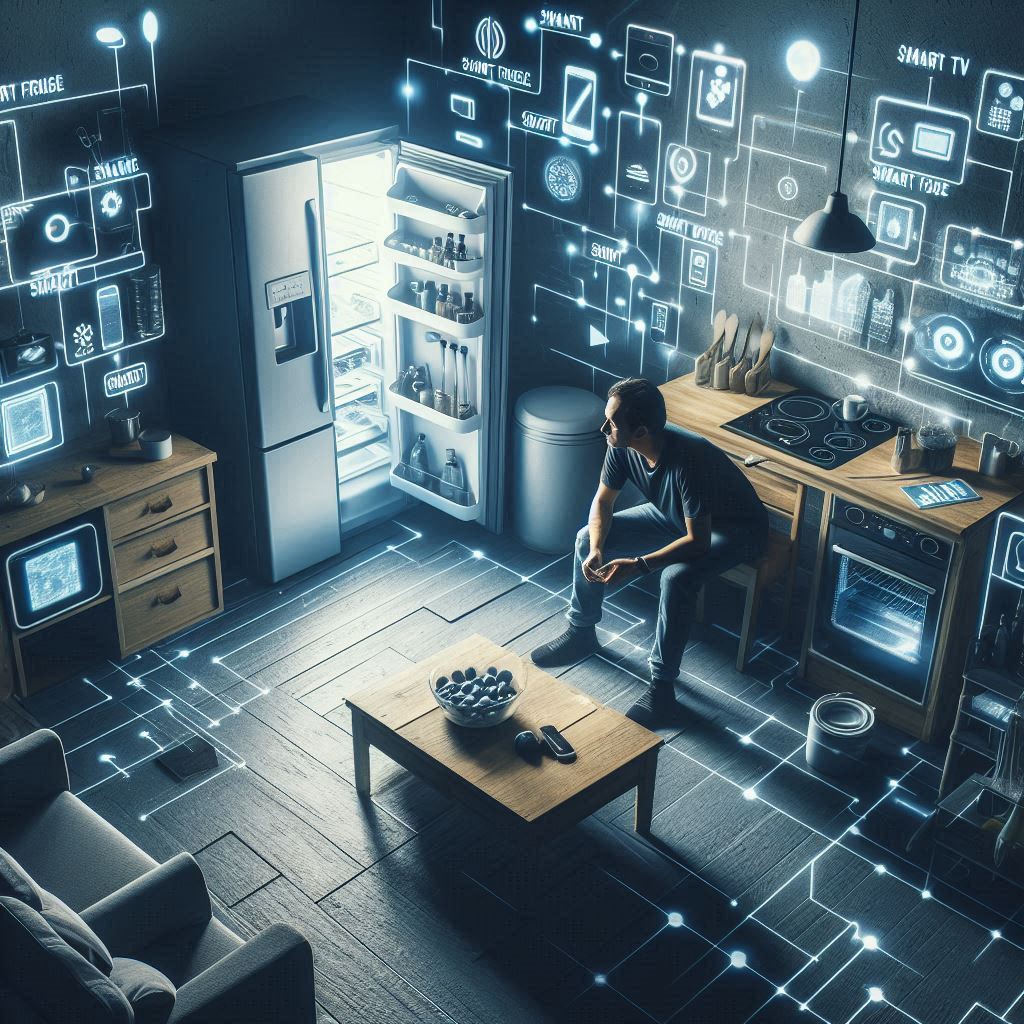Ladies and gentlemen, boys and girls, tech enthusiasts and Luddites alike, I find myself wanting to comment on the utterly absurd world of IoT(Internet of Things) aka smart devices. It amazes me how Silicon Valley’s finest minds work tirelessly to solve problems you didn’t even know you had! I marvel at the incredible pace of innovation, as we race towards a future where even your toothbrush has an IP address.
The Comfort Olympics
Once upon a time, in the distant past (we’re talking way back, like, the 1990s), technology was driven by quaint notions like “innovation” and “discovery.”
Enter the 21st century, where we’ve collectively decided that the true purpose of human ingenuity is to make life so comfortable that we eventually evolve into sentient puddles of goo.
In this brave new world, the pinnacle of achievement is not landing on Mars or solving world hunger. It’s creating a smart toilet that can analyze your output and give you dietary recommendations. Because if there’s one thing the privileged class needs, it’s more unsolicited advice about their health.
The ‘Smart’ Epidemic: When Your Toaster Is Smarter than You
Remember when “smart” used to be a compliment for people? Well, those days are long gone, my friends. Now, smart is reserved for our ever-growing army of gadgets and gizmos. We’ve got smart phones, smart watches, smart fridges, smart lights, smart doorbells, and even smart water bottles. At this rate, it won’t be long before we have smart shoelaces that send you a notification when they’re untied.
But here’s the million-dollar question: as our devices get smarter, are we getting dumber? Picture this: you’re standing in your kitchen, surrounded by appliances with more computing power than NASA had for the moon landing, and you’re using all that technology to watch cat videos while your smart toaster burns your bread. Bravo.
The Great Laziness Revolution: Why Stand When You Can Sit, Why Sit When You Can Lie Down?
In our relentless pursuit of comfort, we’ve waged a war against that most dreaded of human activities: effort. Why get up to turn off the lights when you can just shout at your smart home assistant? Why remember your shopping list when your fridge can order groceries for you? Why use your brain at all when there’s probably an app that can think for you
“Alexa, tell my Roomba to clean the living room, then have my smart oven preheat to 350 degrees, and order me a pizza because I’m too tired from all this delegating.”
“I’m sorry, Dave, but your smart scale has informed me that you’ve exceeded your calorie intake for the day. Might I suggest a nice kale smoothie instead?”
“…Alexa, order me a dumb house.”
The Privilege Paradox: Where the Rich Get Smarter (Devices) and the Poor Get forgotten
Ah, but what about the less fortunate among us? Surely, in our race to create the perfect smart back scratcher, we haven’t forgotten about the billions of people who still lack access to basic necessities?
Awkward silence
Oh, right. It seems in our excitement over the latest $1000 smartphone, we may have overlooked a few minor details. Like the fact that nearly half the world’s population still doesn’t have internet access. Or that millions lack clean water and basic sanitation.
It’s a tale as old as time: the rich get smart devices, and the poor get well, poorer. But fear not. Trickle-down economics assures us that eventually, the wonders of smart technology will reach even the most impoverished corners of the globe. Just imagine: someday, a child in a developing country might be able to ask their AI assistant why they’re hungry, and get a detailed explanation of global wealth inequality.
The Great Irony: When ‘Labor-Saving’ Devices Create More Work
In a twist that would make O. Henry proud, our obsession with labor-saving devices has paradoxically created more work for ourselves. Don’t believe me? Let’s take a journey through a day in the life of a modern, tech-savvy individual:
6:00 AM: Wake up to smart alarm that’s analyzed your sleep patterns. Spend 20 minutes trying to interpret the graphs and charts. Are you well-rested or not? The mystery continues.
7:00 AM: Attempt to make coffee with your smart coffee maker. Spend 15 minutes troubleshooting why it won’t connect to your Wi-Fi. Resort to making instant coffee like a caveman.
8:00 AM: Head to work in your smart car. Arrive 30 minutes late because your car’s AI decided to take you on a “more scenic route.”
12:00 PM: Lunch break! Spend entire hour trying to decide what to eat based on conflicting recommendations from your smart fridge, smart watch, and diet app.
5:00 PM: Return home. Spend evening updating firmware on all your smart devices. Fall asleep on couch, exhausted from all the convenience.
Comfort!
The Skill Extinction: When ‘Auto’ Becomes ‘Forget How To’
Remember skills? Those quaint abilities humans used to have before we outsourced our brains to silicon chips? Well, they’re going the way of the dodo, friends. Why bother learning to cook when your smart oven can do it for you? Why learn to navigate when your phone can tell you where to go? Why think at all when thinking is so 20th century?
We’re rapidly approaching a future where the most valued skill will be the ability to effectively yell at Alexa. Forget reading, writing, and arithmetic. The three Rs of the future will be Reboot, Reset, and Restore to Factory Settings.
The Privacy Paradox: Where Convenience Trumps Common Sense
In our quest for ultimate comfort and convenience, we’ve made a few, let’s call them compromises. Sure, we may have invited corporate giants to listen to our every conversation, track our every movement, and analyze our every purchase. But look on the bright side: now our ads are super relevant.
Who needs privacy when you can have a refrigerator that orders milk for you? So what if it also tells the dairy industry your exact consumption habits, location, and favorite brand of cereal? That’s a small price to pay for never having to write a shopping list again.
And let’s not forget the joy of having a smart speaker in every room. Sure, it might be constantly listening, but think of the convenience. Now you can shout “What’s the weather like?” instead of taking three seconds to look out the window.
The Solution? Embrace Your Inner Caveman (But Keep Your Smartphone, Just in Case)
So, what’s the solution to this “smart” epidemic? Should we smash our phones and return to the days of smoke signals and sundials?
Well, let’s not get too hasty. Those cat videos aren’t going to watch themselves, after all. But perhaps we could strive for a happy medium. Maybe we could use technology as a tool rather than a crutch. Novel concept, I know.
Here are a few radical ideas to get us started:
- Try turning off your phone for an hour a day. I know, I know, it sounds terrifying. But I promise, the world won’t end if you’re not immediately reachable for 60 whole minutes.
- Learn a new skill that doesn’t involve a touchscreen. Pottery, perhaps? Juggling? Competitive bird watching?
- Have a conversation with a real, live human being. (No, Siri doesn’t count.)
- Read a book. You know, those things made of paper? They’re like really long tweets, but without the hashtags.
- Take a moment to think about those less fortunate, and maybe use some of that smart technology to actually make a difference. Crazy, I know, but it just might work.
Epilougue: The ‘Smart’ Future – Where Computers Do The Thinking So We Don’t Have To
As we hurtle towards a future where our toasters are smarter than our politicians (although, let’s be honest, that’s not a very high bar), it’s worth taking a moment to reflect. Are we using technology to enhance our lives, or are we becoming slaves to our own creations?
In our relentless pursuit of comfort and convenience, have we forgotten about the joy of effort, the satisfaction of learning, and the importance of human connection? Have we become so obsessed with making our gadgets smart that we’ve forgotten to apply that same enthusiasm to ourselves and our society?
Perhaps it’s time for a revolution of a different kind. Not one led by AI or smart devices, but by good old-fashioned human intelligence and compassion. A revolution where we use our incredible technological achievements not just to make our lives easier, but to make the world better for everyone.
But who am I kidding? That sounds like a lot of work.
Welcome to the future, folks. It’s pretty comfortable here. As long as you don’t think too hard about it.

